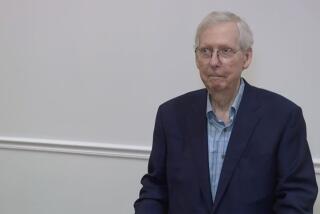NEWS ANALYSIS : Power in Beijing Finally Flowing to Younger Generation : Politics: Ideology and revolutionary prestige now count for little, and leaders’ legitimacy depends on economic progress.
BEIJING — If Deng Xiaoping, China’s paramount leader, had “gone to meet Marx” two or three years ago, he would have left behind a political system in shambles.
A clique of octogenarian comrades-in-arms centered on Deng had reasserted supreme power, overruling Communist Party head Zhao Ziyang to order the brutal 1989 army crackdown on the Tian An Men Square pro-democracy protests. The party was riven between advocates of deep, market-oriented reforms and hard-liners who feared too-rapid change was undermining political control.
Not only students and workers but even leaders at the level of Jiang Zemin, the new Communist Party chief, were cowed by the determination of the old revolutionaries, dubbed the Eight Elders. Had Deng died, supreme power would have passed, at least briefly, to them.
No one knew what might come after that.
The question of succession to Deng is still far from settled. But events of the past six months, capped by the annual session of China’s rubber-stamp Parliament that ended this week, have sharply altered the political scene here. Triggered in part by the death or growing infirmity of key elders, power is finally flowing to a younger generation of leaders.
The opportunity for aging hard-liners to turn back the clock on reform--if that possibility ever really existed--is gone. Six of the Eight Elders are alive. But only Deng, the original architect of reform, still holds decisive power.
If Deng, 88, were to die tomorrow, six younger men, most in their 60s, would hold China’s fate in their hands. If they were to split and mobilize backing from their respective, rival supporters, China could erupt in chaos; the Communist Party itself might collapse.
But if these six men work together--or at least settle their disputes cleanly among themselves--they now control enough levers of power to have a reasonable chance of ruling China’s 1.15 billion people.
The men are:
* Jiang, 66, elevated to the presidency by the National People’s Congress at the annual session that ended Wednesday. He remains party boss and head of the Central Military Commission, roughly equivalent to being armed forces commander in chief. Jiang has the highest titles and is officially called the “core” of the successor generation. But he lacks the personal prestige and connections needed to fully assert authority in the Chinese system.
* Li Peng, 64, confirmed by the Congress for a second term as premier.
* Qiao Shi, 68, former security boss, newly elected as Congress chairman.
* Zhu Rongji, 64, China’s current overall economic czar, elevated at the Congress to be the highest-ranking vice premier.
* Liu Huaqing, 76, a general who was confirmed by the Congress in the No. 2 spot on the military commission.
* Li Ruihuan, 58, the most liberal figure in the top leadership, who last month became chairman of another quasi-parliamentary body, the Chinese People’s Political Consultative Conference.
These six are also the top-ranking figures of the seven-member Politburo Standing Committee installed at a party congress last fall. The six hold all top posts in the party, military, executive branch and parliamentary-style bodies.
The official line is that the new arrangements are a great triumph for the party and for continuing Deng’s twin policies of political dictatorship and economic reform.
“This provides a reliable organizational guarantee for carrying forward the cause pioneered by the elder generations,” the official People’s Daily said Thursday.
But unity within this group, to whatever degree it exists, seems to come from practical necessity.
“What keeps them together is the fact that they know they are weak individually,” a Western diplomat said. “They don’t like each other, but they work together.”
Besides orchestrating these arrangements, Deng has bequeathed his anointed successors a leftist ideology: the vague concept of a “socialist market economy,” a phrase newly enshrined in the constitution by the legislature. This concept implies making China’s economy as capitalist as possible, while retaining a Communist Party dictatorship.
Disjointed as that may sound, China enjoyed economic growth of 12.8% last year, for an average annual expansion over the last five years of 7.9%. This boom has played a key role in bringing at least superficial political stability after the upheavals of 1989.
China’s successor-generation leaders face the cold knowledge that ideology and revolutionary prestige, two old pillars of the regime, are dead. Only economic progress can sustain their legitimacy. Those now on top have a tremendous incentive to keep the boom going. The question is, will this force them together or drive them apart?
In either case, the old ideological concerns of the fading revolutionary elders are barely relevant to today’s China. And for now, this is Deng’s victory.
More to Read
Sign up for Essential California
The most important California stories and recommendations in your inbox every morning.
You may occasionally receive promotional content from the Los Angeles Times.










